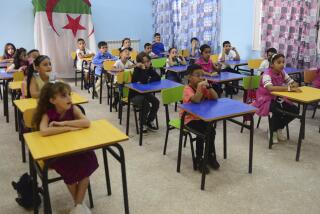Learning a New Language
- Share via
* As someone who came to this country speaking no English and went through the bilingual education program, I get angry at the constant criticism of the program by people who know nothing about it.
Contrary to what people seem to think, a subject like science is not taught entirely in Spanish. It is taught in Spanish, with English words then given for each Spanish phrase. Thus, the students learn both science and English at the same time. That is why it’s called “bilingual” education. There is also at least one class per day dedicated entirely to English. For me and many of my peers, the program was a complete success.
Believe it or not, learning a foreign language is hard. People may speak perfect English now, but rest assured their first-generation ancestors did not. That is why they congregated in Polish ghettos, in Chinatowns, in communities of people who spoke their mother tongue. It was always the second generation who translated for their parents, who were able to learn and speak English.
For those who think it is easier to learn a language by “immersion,” I suggest if their company transfers them to Saudi Arabia they do not put their kids in one of the special “English only” schools but enroll them in one of the local schools and let them try to make sense of the jumble of foreign words and conversation around them.
Maybe then they might have a little more sympathy and respect for students like myself who learn not only the same subjects as their sons and daughters but a new language as well.
JOSE GUZMAN
Fullerton
* Orange Unified School District’s decision to abandon bilingual education is not a slap in the face to the one-third of Orange Unified’s students who are Latinos. It is the advocates of the status quo bilingual program who insult the intelligence and capabilities of Latino students.
Children learn new languages rapidly. It will not take long to get new students sufficiently proficient in English to keep up with their classmates in all subjects. The current bilingual education programs only delay the day students become functional in English.
When I was in second grade, my family moved from California to Italy for a year. When we arrived, my brother and I spoke no Italian, my mother spoke no Italian, and my father spoke marginal Italian. After a few weeks of language instruction, my brother and I were enrolled in a school in which all instruction was in Italian. Within a few weeks, we were able to keep up with all of our subjects, in Italian.
Bilingual education deprives students from certain ethnic groups the chance to become proficient in the subject that is most important to their future success in the United States--English.
DAVID J. ARTHUR
Costa Mesa
More to Read
Sign up for Essential California
The most important California stories and recommendations in your inbox every morning.
You may occasionally receive promotional content from the Los Angeles Times.










